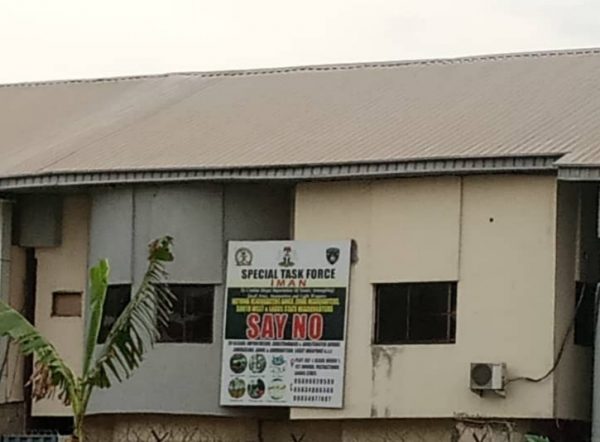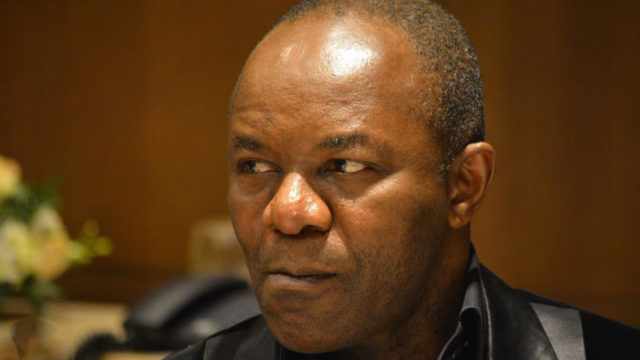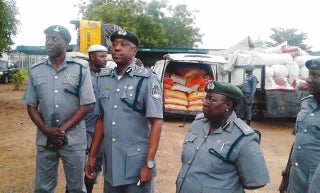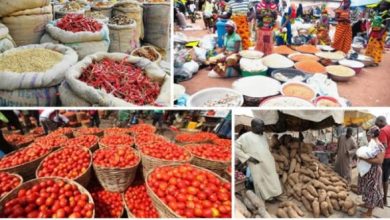Cabotage Flaws: Does NIMASA Sell ‘Waivers’ To Foreign Ships?
*SOAN protests continuous foreign vessels operations
*Omatseye laments administrative glitch, waiver misconception
One year after the attention of the Nigerian Maritime Administration and Safety Agency’s (NIMASA) was drawn to the breach of the NOGICD and Cabotage Acts in the award of contracts to foreign vessel owners in the coastal shipping of petroleum products, the problem persists as the receipts issued to foreign shipping companies by the apex maritime regulatory agency has become waivers to operate Cabotage trade.
Findings have shown that foreign operators continue to practice Cabotage trade on the nation’s territorial waters carrying out a trade that should be exclusively for indigenous operators.
Cabotage vessels, as specified in the Coastal and Inland Shipping Act, 2007, include; passenger vessels, crew boats, bunkering vessels, fishing trawlers, barges, off-shore supply vessels, tugs, Anchor handling tugs and supply vessels, Floating Production Storage and Offloading (FPSO) vessels, tankers and any other craft or vessel for carriage on, through or under Nigerian waters of persons, property or any substance.
Although the onus of endorsing waivers to foreign operators rests squarely on the Minister of Transportation, Hon. Rotimi Amaechi; neither the Minister nor NIMASA has given out any waiver to foreigners. Nevertheless, foreign operators have been approaching the NNPC with receipts from NIMASA to successfully renew their oil logistics deals.
Worried by this development, Ship Owners Association of Nigeria (SOAN) sent a protest letter to the Director General of NIMASA, Dr. Bashir Jamoh and copied the Group Managing Director of NNPC, Mallam Mele Kyari and the Executive Secretary of Nigerian Content Development and Monitoring Board (NCDMB), Engr. Simbi Wabote, last week.
The letter titled: “Re: Registration Of Foreign Flagged Vessels Into The Cabotage Regime For Coastal Shipping Of Petroleum Products” was received at NIMASA on Thursday, March 24th, 2022.
While commending NIMASA, NCDMB, legislators and top management of NNPC for the multiple levels of dialogue on the issue, SOAN described the continuous operations of foreign vessels for Cabotage as an economic sabotage.
Part of the letter read: “NNPC has broken an over 40-year record by giving Nigerian shipping companies the commercial opportunity to supply coastal vessels to NNPC/Marine Logistics for shipping of petroleum products with Nigerian Flagged coastal tankers. However, it is of grave concern to this laudable initiative that foreign-flagged vessels operated by Messrs UNIBROS/ORION MARINE are issued waivers from your good office to partake in the domestic shipping of petroleum products in contravention of our Cabotage and Local Content legislation.”
“ORION MARINE is just an agency and not OWNER of vessels presented to you. During the Legislative public hearings, vide a letter from the Chairman of Federal Inland Revenue Service (FIRS), UNIBROS is not a Nigerian registered taxpayer but has operated in Nigeria illegally for over ten years.”
“We bring this to your notice to exercise your mandate to stop any illegality and ensure they pay relevant customs import duties on these vessels, with evidence provided before adopting the Nigerian flag, just like the Nigerian-owned and flagged vessels operated by Nigerians. Arrest these vessels immediately or cause them to pay the prescribed federal government taxes they have been illegally avoiding. Charge them the requisite penalties in line with section 35 for offences against the Cabotage Act.”
“NNPC has endorsed Nigerian ships as they have met all legal and technical compliance requirements of the Cabotage and NOGICD acts, including flying the Nigerian Flag, import duty payment, taxes, etc., to mention a few. We reiterate that NIMASA, under your leadership, is vested with the power and legal backing to protect and promote indigenous shipping development.”
“SOAN believes that a sincere harmonious synergy with NIMASA is the key to unlocking the economic prosperity and sustainability of our Maritime industry.
When contacted, a former Director General of NIMASA, Barr. Temisan Omatseye described the continuous operations of foreign vessels on account of waivers as a misconception heightened by administrative issues.
His words: “We need to clarify this issue of waivers because NIMASA has told the world that it doesn’t issue waivers. No waiver is being issued because Cabotage can’t be waived. What is happening is that people are using the receipts that they paid to NIMASA to get waivers to act like they have been given waivers. After making those payments, the applicants ought to take the receipts to the Minister of Transportation who has the responsibility to grant the waivers. Since this issue started, the Minister says that he never granted a single waiver. However, people are going to NNPC with the receipts.”
Noting that the Cabotage Act demands that operators have a licence to trade, Omatseye stressed that anyone trading without that licence is trading illegally.
According to him, penalties shouldn’t only be imposed on vessels trading illegally but also on the persons or organizations that contract such vessels as this approach would ensure that people do the proper due diligence before engaging vessels for Cabotage trade.
“Right now, we aren’t doing this due diligence; that’s why NNPC gives contracts to vessels and says the vessel owners brought receipts. The receipts merely prove that the vessel owners applied for ownership, to build a vessel or operate in the nation’s waters. When they apply for this, they make payments and obtain receipts from NIMASA. It’s these payments that form part of the documents NIMASA sends to the Transportation Minister for an approval. Since this issue started the Minister hasn’t granted any approval. This is frustrating the moves by ship owners to get NNPC cargoes.”
“No foreign operator can claim to be trading in Nigeria because they have waivers. They paid for the process but the law clearly states that only the Minister can grant waivers. It’s an administrative process which hasn’t been tidied up. Nevertheless, it is important that this process be streamlined so all operators know what they are doing. The law is there but it appears like we have refused to read it and implement it for about 18 years,” he added.
Meanwhile, the SOAN President, Dr. Mkgeorge Onyung told MMS Plus that the group’s protest letter isn’t personal against any individual or organization, but a fight for sustainable indigenous ship operations in the country and for posterity.
He cited Section 105 of the NOGICD ACT 2010 which focused on Enforcement of Compliance and stipulates that “the Nigerian Content Monitoring Board in conjunction with NIMASA shall have powers to enforce compliance with relevant sections of Coastal and Inland Shipping (Cabotage) Act in relation to matters pertaining to Nigerian content development”
Onyung urged NIMASA to exercise its mandate by bringing to public knowledge the ideal processes such that every ship owner and his or her client knows who should be in operations and who shouldn’t, even as the agency ensures those violating the laws are arrested.
“It is our duty and rights to ensure that we maintain the laws of Nigeria which shouldn’t be against but in support of the citizens of the country. These foreign operators don’t pay duties on the vessels and they also don’t pay taxes. NIMASA has the mandate to arrest these ships,” he said
According to him, whenever foreign ships make efforts to trade on Nigerian waters, whoever wants that ship must have advertised in a national daily as to what ship they require and only when no Nigerian ship that meets the criteria should a foreign ship be admitted for a period of one year.
“For a vessel to stay in the country and keep renewing the license is taking up the opportunities of indigenous ship owners who pay duties and taxes, employ Nigerian cadets and contribute to the nation’s economy,” he argued.
Meanwhile, the Chief Executive of Oceanic Energy Limited, Capt. Taiwo Akinpelumi told our correspondent that the change from foreign dominance in the Nigerian oil logistics sector will be replaced by indigenous operations gradually.
His words: “The effort to get Nigerian ship owners involved in the handling of NNPC cargoes is a process. We shouldn’t expect the change from foreign operators to indigenous companies to happen suddenly. However, we can be delighted that NIMASA is coasting home by identifying and engaging indigenous operators to partake in the trade.”
“While this is ongoing gradually, it’s important to note that there can never be a vacuum in such a business. The foreigners in the business will fizzle out in no time.”
When contacted on Friday, an Assistant Director, Public Relations at NIMASA, Mr. Osagie Edwards confirmed that the agency received the letter of protest from SOAN the previous day.
He, however, assured that the agency has begun moves to address the issue and will make findings known to the public at the appropriate time.
One year after the attention of the Nigerian Maritime Administration and Safety Agency’s (NIMASA) was drawn to the breach of the NOGICD and Cabotage Acts in the award of contracts to foreign vessel owners in the coastal shipping of petroleum products, the problem persists as the receipts issued to foreign shipping companies by the apex maritime regulatory agency has become waivers to operate Cabotage trade.
Findings have shown that foreign operators continue to practice Cabotage trade on the nation’s territorial waters carrying out a trade that should be exclusively for indigenous operators.
Cabotage vessels, as specified in the Coastal and Inland Shipping Act, 2007, include; passenger vessels, crew boats, bunkering vessels, fishing trawlers, barges, off-shore supply vessels, tugs, Anchor handling tugs and supply vessels, Floating Production Storage and Offloading (FPSO) vessels, tankers and any other craft or vessel for carriage on, through or under Nigerian waters of persons, property or any substance.
Although the onus of endorsing waivers to foreign operators rests squarely on the Minister of Transportation, Hon. Rotimi Amaechi; neither the Minister nor NIMASA has given out any waiver to foreigners. Nevertheless, foreign operators have been approaching the NNPC with receipts from NIMASA to successfully renew their oil logistics deals.
Worried by this development, Ship Owners Association of Nigeria (SOAN) sent a protest letter to the Director General of NIMASA, Dr. Bashir Jamoh and copied the Group Managing Director of NNPC, Mallam Mele Kyari and the Executive Secretary of Nigerian Content Development and Monitoring Board (NCDMB), Engr. Simbi Wabote, last week.
The letter titled: “Re: Registration Of Foreign Flagged Vessels Into The Cabotage Regime For Coastal Shipping Of Petroleum Products” was received at NIMASA on Thursday, March 24th, 2022.
While commending NIMASA, NCDMB, legislators and top management of NNPC for the multiple levels of dialogue on the issue, SOAN described the continuous operations of foreign vessels for Cabotage as an economic sabotage.
Part of the letter read: “NNPC has broken an over 40-year record by giving Nigerian shipping companies the commercial opportunity to supply coastal vessels to NNPC/Marine Logistics for shipping of petroleum products with Nigerian Flagged coastal tankers. However, it is of grave concern to this laudable initiative that foreign-flagged vessels operated by Messrs UNIBROS/ORION MARINE are issued waivers from your good office to partake in the domestic shipping of petroleum products in contravention of our Cabotage and Local Content legislation.”








